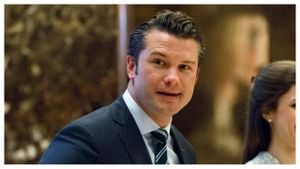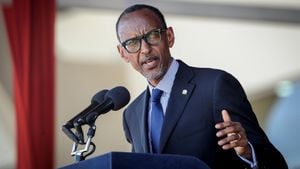Ukrainian President Volodymyr Zelenskyy recently hinted at the possibility of ending the war with Russia sooner than expected, with the upcoming presidency of Donald Trump being significant to the timeline.
This year marks nearly 1,000 days since the conflict erupted, and as tensions continue to rise, Zelenskyy voiced optimism about Trump’s policies potentially leading to expedited negotiations. Speaking to Ukrainian broadcaster Suspilne, he stated, "We must do everything so this war ends next year through diplomatic means." Zelenskyy's remark came amid fresh escalations, with Russia launching what he termed "a massive combined attack" involving 120 missiles and numerous drone strikes targeting energy infrastructure across Ukraine.
On the ground, the impact of these attacks has been devastating. Recently, two lives were lost, and multiple others, including children, were injured due to drone strikes, reflecting the escalation of violence as both sides gear up for possible shifts at the diplomatic table.
Earlier statements from Trump indicated his confidence in resolving the conflict quickly, claiming, "If I were president, the Ukraine-Russia conflict would not have begun, and I could end it swiftly." His approach to the situation has reportedly garnered traction among Europe’s leaders, who worry about Ukraine's waning advantages as time presses on during this conflict.
Zelenskyy expressed hope about the incoming administration's willingness to engage diplomatically. He noted, “It is certain the war will end sooner with the policies of the team leading the White House.” His perspective ties Trump’s anticipated stance to the potential for faster resolution, emphasizing the necessity of diplomatic engagement.
Historically, as the conflict has evolved, the idea of ceasing hostilities has shifted. Trump previously stated during the campaign trail his intention to negotiate peace, indicating he might align with European allies increasingly anxious about the repercussions of prolonged war on global security and stability.
Yet skepticism remains about the feasibility of any resolution. Zelenskyy reiterated Ukraine's refusal to enter discussions from any position of weakness, emphasizing the importance of maintaining Ukraine's territorial integrity, which is understandably entwined with national pride and security.
During this delicate period, Ukraine’s Foreign Minister noted efforts to facilitate meetings between Zelenskyy and Trump. The anticipated meeting would likely focus on how Trump plans to approach his promises and what terms he envisions for peace. Early diplomatic efforts, such as outreach to Japan for wider support, seek to solidify Ukraine’s position on the global stage.
Despite the hope for alignment with Trump’s administration, Zelenskyy acknowledged the complex nature of Russian President Vladimir Putin’s approach to negotiations. He highlighted Putin’s tendency to prolong discussions without genuine intent to reach agreements. “Sitting, talking, and agreeing on nothing is beneficial for Putin,” Zelenskyy summarized, capturing the frustration and urgency felt within Ukraine's leadership.
The stakes are high, not just for Ukraine but for global powers involved as well. Following discussions with German Chancellor Olaf Scholz, who urged Russia to engage with Ukraine, the discourse around peace efforts intensifies. Zelenskyy condemned the timing and nature of such outreach, expressing concerns it plays directly to Putin's strategy of maneuvering for international acceptance.
While many continue to express hope for peace, the reality on the ground—marked by extensive military action and civilian suffering—remains grim. Ukraine’s leadership is striving to showcase resilience and determination. Zelenskyy maintains vigilance, stating, "For us, victory means a strong Ukraine, whether through diplomacy or on the battlefield.” With all eyes on the negotiations potentially catalyzed by the incoming U.S. administration, the coming weeks and months will prove pivotal.
Trump’s presidency may usher in new dialogues on Ukraine’s sovereignty, international alliances, and long-standing territorial disputes. Analysts suggest his anticipated policies could either consolidate or fracture existing alliances within Europe, depending largely on the nature of U.S. support and narrative framing around Ukraine's plight.
Woven intricately within the geopolitical fabric are the desires of ordinary Ukrainians who wish for an end to the conflict affecting their daily lives. Each diplomatic overture, every missile strike, and negotiation attempt carries their hopes for peace and stability. If anything is clear, the resolution to the Ukraine-Russia war is multifaceted—infected by historical grievances, territorial desires, and the bold aspirations of national leaders striving to craft their legacies.
Lastly, with voices calling for peace growing louder internationally, Zelenskyy emphasizes unity, stating, “We must do everything... to carry forth the strength and courage of Ukraine.” His call reflects the broader consensus among supporters and strategists alike within the global political community. The pathway to peace may be fraught with obstacles, but it is echoed through Biden’s administration, Russia's strategies, European allies’ demands, and the steadfast resolve of Ukraine.
For now, the world watches, far too aware of the tragic cost of war, but hopeful for resolution.



